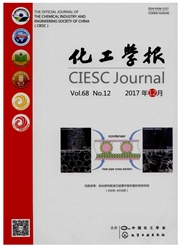

 中文摘要:
中文摘要:
含氧过多是限制藻类液化油实际应用的最大障碍,高含氧量意味着热值低、稳定性差、酸性强等,因此必须经过脱氧改质才能使其转化为高品位燃油。结合最新研究进展,首先选取藻类液化油中具有代表性的成分脂肪酸为模型化合物,总结了催化剂组成和反应气氛对脂肪酸脱氧机理及反应活性的影响。其次对目前国内外藻类液化原油及其轻馏分的催化脱氧改质研究现状进行综述。最后指出藻类液化生物油催化改质存在的问题,并对改进方法及未来的发展进行了展望。
 英文摘要:
英文摘要:
Fuel production from renewable and carbon-neutral biomass has attracted much attention due to concerns for the depletion of petroleum reserves and global warming by greenhouse gases. Microalgae offer several advantages over conventional biomass as they have faster growth rate, do not require agricultural land for growth, and consume less water than terrestrial biomass. However, crude bio-oil from noncatalytic liquefaction of microalgae has a high content of oxygen, limiting its direct applications for transportation fuel. The high oxygen content suffers from some drawbacks such as lower energy density, poor oxidation stability and high corrosivity, so it should be deoxygenation upgraded as a high grade fuel. In this review, the effect of reaction atmosphere and nature of catalyst on the reaction pathways of the deoxygenation of fatty acids model compounds is discussed firstly. Then, related researches are reviewed based on crude oil of microalgal. Finally, problems in current bio-oil catalytic deoxygenation technologies, improvement advices and future prospect are also presented.
 同期刊论文项目
同期刊论文项目
 同项目期刊论文
同项目期刊论文
 Production of Liquid Fuel via Coliquefaction of Coal and Dunaliella tertiolecta in a Sub-/Supercriti
Production of Liquid Fuel via Coliquefaction of Coal and Dunaliella tertiolecta in a Sub-/Supercriti Preparation of solid acid catalyst packing AAO/SBA-15-SO3H and application for dehydration of xylose
Preparation of solid acid catalyst packing AAO/SBA-15-SO3H and application for dehydration of xylose Co-Pyrolysis Behaviors of the Cotton Straw/PP Mixtures and Catalysis Hydrodeoxygenation of Co-Pyroly
Co-Pyrolysis Behaviors of the Cotton Straw/PP Mixtures and Catalysis Hydrodeoxygenation of Co-Pyroly Thermal characterization and kinetic analysis of nesquehonite, hydromagnesite, and brucite, using TG
Thermal characterization and kinetic analysis of nesquehonite, hydromagnesite, and brucite, using TG Towards conversion of octanoic acid to liquid hydrocarbon via hydrodeoxygenation over Mo promoter ni
Towards conversion of octanoic acid to liquid hydrocarbon via hydrodeoxygenation over Mo promoter ni Thermochemical conversion of low-lipid microalgae for the production of liquid fuels: Challenges and
Thermochemical conversion of low-lipid microalgae for the production of liquid fuels: Challenges and Direct Liquefaction of Dunaliella tertiolecta for Production of Bio-Oil in Sub/Supercritical Ethanol
Direct Liquefaction of Dunaliella tertiolecta for Production of Bio-Oil in Sub/Supercritical Ethanol Production of diesel-like hydrocarbons from stearic acid via hydrodeoxygenation over Mo2C/CNTs catal
Production of diesel-like hydrocarbons from stearic acid via hydrodeoxygenation over Mo2C/CNTs catal 期刊信息
期刊信息
